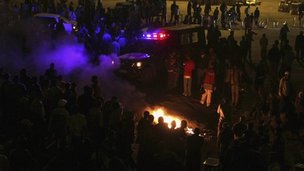At least five people have been killed and dozens of others injured after a grenade attack on a bus terminal in the Kenyan capital, Nairobi, officials say.
Witnesses say three grenades were hurled from a vehicle passing the bus station in central Nairobi.
Police blamed the attack on militants of the Somali Islamist group al-Shabab.
The incident is similar to attacks last October when one person was killed and many injured after grenades were thrown into a bar and a bus station.
That attack happened just days after the Kenyan military had crossed into Somalia to fight the Somali militants and was also blamed on al-Shabab.
"This is a cowardly act by al-Shabab elements," police spokesman Charles Owino is quoted by the AFP news agency as saying at the bus station. "But we will not relent in the war. We will get them and we will continue with the war."
——————————————————————————–
In recent months there have been numerous attacks close to the Kenyan-Somali border.
Officials have blamed these on al-Shabab sympathisers acting in response to Kenya's military operation.
Across the border in Somalia, there has been heavy fighting between the Islamist militants and Ethiopian forces.
These were the fiercest clashes since the Ethiopian army last November joined the Kenyan and African Union troops in the fight against al-Shabab.
However, no group has said it carried out the attack.
There has been a string of small arms attacks and explosions on Kenyan soil ever since Kenyan troops crossed the border. Kenyan soldiers fighting al-Shabab in Somalia are due to be integrated into the African Union peacekeeping force next week.
The group has threatened to attack Kenya on several occasions. Police there recently arrested several people over an alleged plot to blow up a hotel on the Kenyan coast.
After Saturday's explosions, a fire blazed in a small crater at the Machakos bus station and bystanders helped carry the wounded to ambulances, Reuters news agency reports.
One witness said that the grenades were thrown from a passing vehicle.
"I survived because I was in a bus that was still loading people," Charles Njenga told AFP news agency.
BBC

